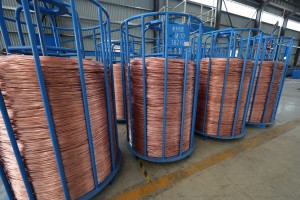Due to its excellent electrical conductivity, copper is a widely used metal in various electrical applications. It has several physical and chemical properties that make it an ideal conductor of electricity.

First, copper has high electrical conductivity. Conductivity refers to the ability of a material to carry an electric current. Copper has one of the highest electrical conductivity of all metals. Its conductivity at room temperature is approximately 58.5 million Siemens per meter (S/m). This high conductivity means that copper can efficiently transport charge and minimize energy loss in the form of heat. It enables the efficient flow of electrons, enabling the transmission of power over long distances without significant power loss.
One of the reasons copper is highly conductive is its atomic structure. Copper has only one electron in its outermost shell, loosely bound to the nucleus. This structure allows electrons to move freely within the copper’s lattice structure. When an electric field is applied, these free electrons can easily move through the lattice, carrying an electric current with minimal resistance.
In addition, copper has low resistivity. Resistivity refers to the inherent resistance of a material to the flow of electrical current. The resistivity of copper at room temperature is about 1.68 x 10^-8 ohm-meters (Ω·m). This low resistivity means copper offers very little resistance to the flow of electrons, minimizing energy loss and heat generation. Low resistivity is critical for applications involving high current demands, such as power transmission and wires.
Copper’s excellent electrical conductivity is also due to its thermal properties. It has high thermal conductivity, which means it conducts heat efficiently. This property is very useful in electrical applications because it allows copper to dissipate the heat generated by the flow of electric current. Effective heat dissipation helps maintain the stability and reliability of electrical components, preventing overheating and ensuring their long-term performance.
Additionally, copper is a highly ductile metal. Ductility refers to the ability of a material to be drawn into thin wires without breaking. Copper’s high ductility makes it ideal for wire because it can be easily shaped and formed into thin, flexible wires. These wires can be routed in complex configurations, making them ideal for a variety of electrical applications, including residential, commercial and industrial buildings.
Copper also exhibits good corrosion resistance. When exposed to air, it forms a protective oxide layer that prevents further corrosion and degradation. This characteristic is critical in electrical applications as it ensures the long-term reliability and durability of copper conductors. Copper’s corrosion resistance allows it to maintain its electrical conductivity for a long time even in harsh environments.
Another advantage of copper as an electrical conductor is its abundance and availability. Copper is an abundant element widely distributed around the world. This accessibility makes it a cost-effective choice for electrical applications because it is readily available and relatively inexpensive compared to other high-conductivity metals.
In summary, copper is an excellent electrical conductor due to its high electrical conductivity, low resistivity, thermal properties, ductility, corrosion resistance, and abundance. Its unique atomic structure and physical properties allow efficient transport of charges with minimal energy loss. Copper’s exceptional electrical conductivity makes it an indispensable material in numerous electrical applications, from power transmission and wires to electronic components and circuits.
Email: sales@zhongweicables.com
Mobile/Whatspp/Wechat: +86 17758694970
Post time: 2023-08-21





